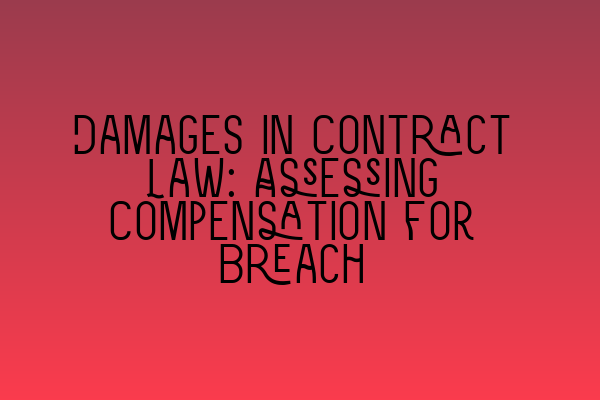Damages in Contract Law: Assessing Compensation for Breach
When parties enter into a contract, there is an expectation that both sides will fulfill their respective obligations. However, there are instances when one party breaches the contract, causing harm or loss to the other party. In such cases, the injured party is entitled to receive compensation, called damages, to put them in the position they would have been in if the breach had not occurred. This article will explore the different types of damages in contract law and how they are assessed.
1. Types of Damages
There are various types of damages that a court may award in contract law, depending on the nature of the breach and the losses suffered by the injured party. These include:
1.1. Compensatory Damages
Compensatory damages aim to reimburse the injured party for the actual loss they have suffered as a result of the breach. The goal is to put the injured party in the position they would have been in if the contract had been performed as agreed. Compensatory damages can cover both direct and consequential losses.
In the case of real-life case studies, compensatory damages may include the cost of repairs, lost profits, or the difference in value between what was promised and what was delivered.
1.2. Expectation Damages
Expectation damages are a type of compensatory damages that aim to place the injured party in the position they would have been in if the breaching party had fully performed the contract. It seeks to compensate for the loss of the expected benefit under the contract.
For example, if a seller fails to deliver goods as promised, the buyer may be awarded expectation damages equal to the difference between the contract price and the market price of the goods at the time of the breach.
1.3. Reliance Damages
Reliance damages are awarded when the injured party has relied on the contract and suffered losses as a result of that reliance. It aims to compensate the injured party for expenses incurred in preparation for the contract or in reliance on the contract.
For instance, if a construction project is canceled due to a breach by the employer, the contractor may be entitled to reliance damages for the costs incurred in purchasing materials and hiring labor.
1.4. Restitutionary Damages
Restitutionary damages are awarded in situations where one party has been unjustly enriched at the expense of the other party. It aims to restore the injured party to the position they were in before the contract was made.
For example, if a contractor completes work under a contract, but the employer wrongfully terminates the contract, the contractor may be entitled to restitutionary damages for the value of the work completed.
2. Assessing Damages
The assessment of damages in contract law can be a complex process. The court’s goal is to provide fair compensation to the injured party without overcompensating or punishing the breaching party excessively.
When assessing damages, the court will consider several factors, including:
2.1. Loss Causation
The injured party must establish a causal connection between the breach of contract and the losses suffered. They must demonstrate that their losses were a direct result of the breaching party’s failure to fulfill their obligations.
2.2. Foreseeability
The court will consider whether the breaching party could have reasonably foreseen the losses that were suffered as a result of the breach. If the losses were foreseeable, the injured party is more likely to be awarded damages.
2.3. Mitigation
The injured party has a duty to mitigate their losses by taking reasonable steps to minimize the extent of the damage. Failure to mitigate may limit the damages that can be claimed.
2.4. Certainty
The court will require the injured party to provide sufficient evidence to prove the amount of their losses with reasonable certainty. Speculative or uncertain damages may not be awarded.
3. Conclusion
Damages play a crucial role in contract law by providing compensation to the injured party for losses suffered as a result of a breach. The different types of damages, such as compensatory, expectation, reliance, and restitutionary damages, aim to restore the injured party to their pre-contract position or provide them with the benefit they would have received if the contract had been performed as agreed.
Assessing damages involves considering factors such as loss causation, foreseeability, mitigation, and certainty. It is essential to seek legal advice from a solicitor to understand the specific circumstances of your case and to ensure you receive the appropriate compensation for the breach.
Related Articles:
- Unveiling Real-Life Case Studies: Insights into Legal Practice and Decision-Making
- Exploring Solicitor Salaries in the UK: Average Earnings and Factors Affecting Income
- Mastering Client Relationship Management: Skills for Solicitors to Enhance Trust and Loyalty
- Pursuing a Law School Education in the UK: Choosing the Right Path for Your Future
- Securing Training Contracts: A Roadmap to Becoming a Solicitor
